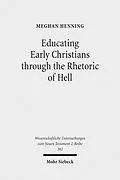In this book, Meghan Henning explores the rhetorical function of the early Christian concept of hell. Building upon classical rhetorical techniques and the descriptions of Hades in Greek and Roman literature, she contends that the ancient Christian concept of hell was developed as a part of a distinctively Christian paideia. She traces the history of this interpretive process, illustrating the ways in which early Christians drew upon the Greek and Roman system of ethical and cultural education, to create and maintain their own culture. By doing this the author demonstrates that Matthew's gospel is the nexus in which early Christian ideas about eternal punishment begin to crystallize, and becomes the focal point for later apocalyptic and patristic authors who interpret and reshape Matthew's 'weeping and gnashing of teeth' in a variety of pedagogical contexts.
Born 1982; 2004 BA from Denison University; 2007 MA from Yale Divinity School; 2013 PhD in New Testament from Emory University; currently teacher at several colleges and universities in the Boston area, and Faculty Religion Fellow at the Boston University School of Theology and the Institute on Religion, Culture and World Affairs.
Autorentext
Born 1982; 2004 BA from Denison University; 2007 MA from Yale Divinity School; 2013 PhD in New Testament from Emory University; currently teacher at several colleges and universities in the Boston area, and Faculty Religion Fellow at the Boston University School of Theology and the Institute on Religion, Culture and World Affairs.
Autorentext
Born 1982; 2004 BA from Denison University; 2007 MA from Yale Divinity School; 2013 PhD in New Testament from Emory University; currently teacher at several colleges and universities in the Boston area, and Faculty Religion Fellow at the Boston University School of Theology and the Institute on Religion, Culture and World Affairs.
Titel
Educating Early Christians through the Rhetoric of Hell
Untertitel
'Weeping and Gnashing of Teeth' as Paideia in Matthew and the Early Church
Autor
EAN
9783161575051
Format
E-Book (pdf)
Hersteller
Genre
Veröffentlichung
01.12.2019
Digitaler Kopierschutz
Adobe-DRM
Dateigrösse
2.69 MB
Anzahl Seiten
307
Unerwartete Verzögerung
Ups, ein Fehler ist aufgetreten. Bitte versuchen Sie es später noch einmal.
